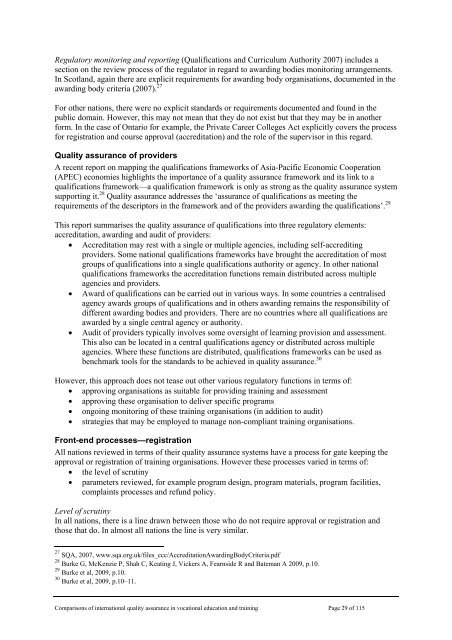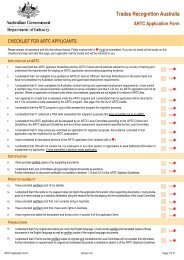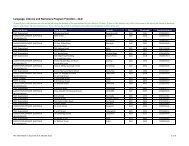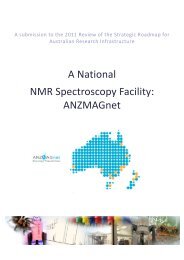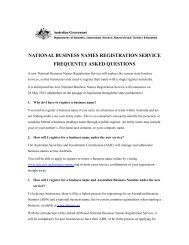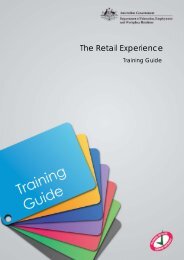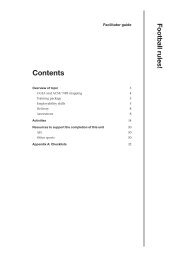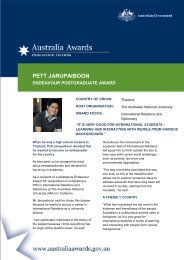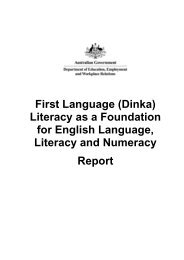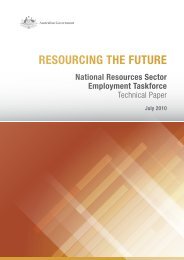Review - Department of Innovation, Industry, Science and Research
Review - Department of Innovation, Industry, Science and Research
Review - Department of Innovation, Industry, Science and Research
Create successful ePaper yourself
Turn your PDF publications into a flip-book with our unique Google optimized e-Paper software.
Regulatory monitoring <strong>and</strong> reporting (Qualifications <strong>and</strong> Curriculum Authority 2007) includes a<br />
section on the review process <strong>of</strong> the regulator in regard to awarding bodies monitoring arrangements.<br />
In Scotl<strong>and</strong>, again there are explicit requirements for awarding body organisations, documented in the<br />
awarding body criteria (2007). 27<br />
For other nations, there were no explicit st<strong>and</strong>ards or requirements documented <strong>and</strong> found in the<br />
public domain. However, this may not mean that they do not exist but that they may be in another<br />
form. In the case <strong>of</strong> Ontario for example, the Private Career Colleges Act explicitly covers the process<br />
for registration <strong>and</strong> course approval (accreditation) <strong>and</strong> the role <strong>of</strong> the supervisor in this regard.<br />
Quality assurance <strong>of</strong> providers<br />
A recent report on mapping the qualifications frameworks <strong>of</strong> Asia-Pacific Economic Cooperation<br />
(APEC) economies highlights the importance <strong>of</strong> a quality assurance framework <strong>and</strong> its link to a<br />
qualifications framework—a qualification framework is only as strong as the quality assurance system<br />
supporting it. 28 Quality assurance addresses the ‘assurance <strong>of</strong> qualifications as meeting the<br />
requirements <strong>of</strong> the descriptors in the framework <strong>and</strong> <strong>of</strong> the providers awarding the qualifications’. 29<br />
This report summarises the quality assurance <strong>of</strong> qualifications into three regulatory elements:<br />
accreditation, awarding <strong>and</strong> audit <strong>of</strong> providers:<br />
• Accreditation may rest with a single or multiple agencies, including self-accrediting<br />
providers. Some national qualifications frameworks have brought the accreditation <strong>of</strong> most<br />
groups <strong>of</strong> qualifications into a single qualifications authority or agency. In other national<br />
qualifications frameworks the accreditation functions remain distributed across multiple<br />
agencies <strong>and</strong> providers.<br />
• Award <strong>of</strong> qualifications can be carried out in various ways. In some countries a centralised<br />
agency awards groups <strong>of</strong> qualifications <strong>and</strong> in others awarding remains the responsibility <strong>of</strong><br />
different awarding bodies <strong>and</strong> providers. There are no countries where all qualifications are<br />
awarded by a single central agency or authority.<br />
• Audit <strong>of</strong> providers typically involves some oversight <strong>of</strong> learning provision <strong>and</strong> assessment.<br />
This also can be located in a central qualifications agency or distributed across multiple<br />
agencies. Where these functions are distributed, qualifications frameworks can be used as<br />
benchmark tools for the st<strong>and</strong>ards to be achieved in quality assurance. 30<br />
However, this approach does not tease out other various regulatory functions in terms <strong>of</strong>:<br />
• approving organisations as suitable for providing training <strong>and</strong> assessment<br />
• approving these organisation to deliver specific programs<br />
• ongoing monitoring <strong>of</strong> these training organisations (in addition to audit)<br />
• strategies that may be employed to manage non-compliant training organisations.<br />
Front-end processes—registration<br />
All nations reviewed in terms <strong>of</strong> their quality assurance systems have a process for gate keeping the<br />
approval or registration <strong>of</strong> training organisations. However these processes varied in terms <strong>of</strong>:<br />
• the level <strong>of</strong> scrutiny<br />
• parameters reviewed, for example program design, program materials, program facilities,<br />
complaints processes <strong>and</strong> refund policy.<br />
Level <strong>of</strong> scrutiny<br />
In all nations, there is a line drawn between those who do not require approval or registration <strong>and</strong><br />
those that do. In almost all nations the line is very similar.<br />
27 SQA, 2007, www.sqa.org.uk/files_ccc/AccreditationAwardingBodyCriteria.pdf<br />
28 Burke G, McKenzie P, Shah C, Keating J, Vickers A, Fearnside R <strong>and</strong> Bateman A 2009, p.10.<br />
29 Burke et al, 2009, p.10.<br />
30 Burke et al, 2009, p.10–11.<br />
Comparisons <strong>of</strong> international quality assurance in vocational education <strong>and</strong> training Page 29 <strong>of</strong> 115


